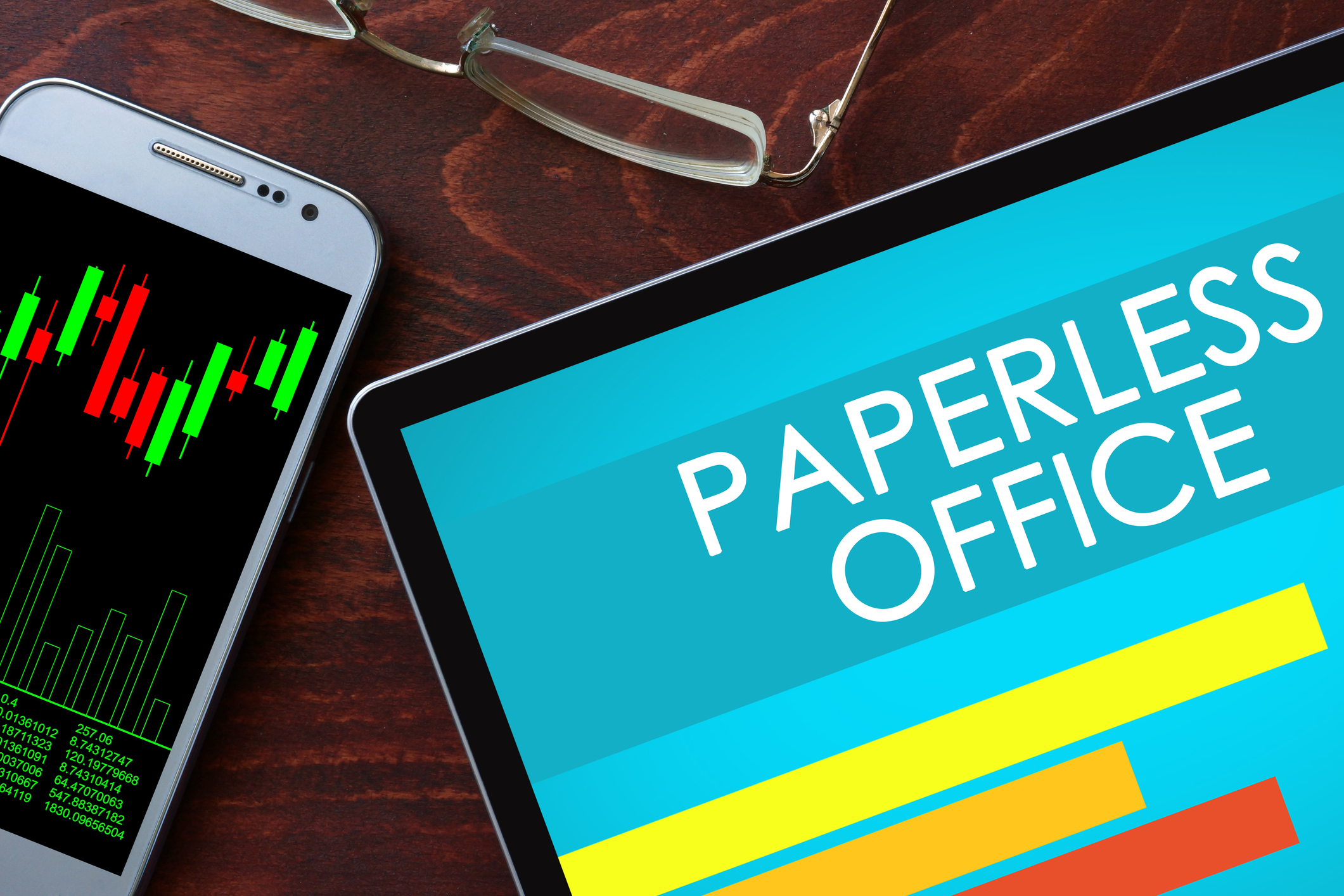Tag: credit cards
Resolve to Go Paperless in 2022
December 30, 2021

In January, follow the example of the U.S. government that has committed to moving to a paperless archival system by December 31, 2022. The Office of Management and Budget’s (OMB) directive for government agencies to transition to electronic records has prompted them to take steps in their modernization journeys.
The government faces multiple challenges with paper records, such as burdens on the workforce and high costs to manually create, use, and store nonelectronic information. As an individual, you may face similar dilemmas in dealing at home with your printed files, insurance records, and other important documents that would be difficult to replace if damaged or destroyed by natural disasters or accidents.
As government agencies transition to electronic records, many are experimenting with new technologies to sort through electronically stored information. Universities and businesses also have guidelines for storing electronic records in online repositories that they strive to:
- Back up regularly
- Comply with all privacy and security requirements
- Allow for shared access through a network or a cloud-based program
- Organize in such a way that records can be identified and purged appropriately
- Set up to migrate content to a new system upon replacement
- Maintain through regular software updates
InsureYouKnow.org
After you review the electronic storage practices of the government, universities, and businesses, establish your own ground rules for storing your important records at InsureYouKnow.org. Keep in mind the following tips:
- A systematic plan for keeping track of important documents can save you hours of anxious searching for misplaced items. It also can help you reduce the number of nonimportant papers cluttering your home.
- It is important to carefully store valuable papers which would be difficult or time-consuming to replace. Original hard-to-replace documents are ideally kept in a safe deposit box or a fire-proof, waterproof, burglar-proof home safe or lockbox. Scanned copies can be stored at InsureYouKnow.org where they will be readily accessible.
- Electronically stored records must be legible, readable, and accessible for the period of limitations required. It is important to back up electronic files at InsureYouKnow.org in case of a computer malfunction in your home office.
- Wherever you live, there is always a risk of fires, floods, and other disasters, and your home and important documents could be destroyed. If you have stored photographic images, you’ll have records accessible whenever you need them, including keeping peace of mind knowing documents are indestructible at InsureYouKnow.org.
Valuable papers can be sorted into two types: those needed for day-to-day use and those needed occasionally.
Examples of valuable papers used frequently include:
- Drivers’ licenses
- Credit cards
- Health insurance cards
- Bank account records
- Identification cards
- Special health documentation such as COVID-19 vaccinations, allergies, disabling conditions, prescriptions, and blood types for family members
Examples of valuable papers used occasionally include:
- Birth, marriage, and death certificates
- Deeds, leases, and property records and titles
- Income and employment records
- Passports
- Contracts
- Insurance policies
- Income tax records
- Military papers
- Divorce decrees
- Social Security records
- Retirement and pension plans
- Wills
Regular filing and reviewing of paper and electronic documents are important. Making decisions on when to discard old, printed files and purge electronic versions may be difficult but worth the effort to keep accurate, up-to-date records.
Have Insurance, Will Travel
June 15, 2021

You’ve done your planning, scheduled time off, and made reservations for a well-deserved vacation. But what if something unforeseen happens–like lost luggage, flight delays, or a medical emergency–to upend the time away you had envisioned? You may want to add to your pre-trip checklist travel insurance, a type of policy that reimburses you for money you lose from non-refundable deposits and payments when something goes wrong on your trip.
A general rule to consider is that the more you’re spending on your trip, the more likely you’ll need travel insurance. Costs for international trips and cruises can add up quickly and being away from a safety net at home can be fraught with problems. But don’t hastily sign up for travel insurance and neglect to understand what is and isn’t covered by the plan you are considering. Do some comparison shopping for travel insurance and look for options that match your needs.
Policy Benefits to Consider
- Cancellation allowed for any reason
- Emergency medical expenses, including coverage for COVID-19 and dental care
- Emergency medical evacuation
- Trip cancellation reimbursement
- Ability to review a purchased policy and to reconsider enrollment without penalty
- Reimbursement for lost baggage
- Compensation for missed connection, travel delay, trip interruption or cancellation due to injuries, weather, hurricanes, or terrorism
- Coverage for lost or stolen passports
Mistakes to Avoid
- Skipping travel insurance
- Failing to find a plan that covers COVID-19 or another coronavirus outbreak
- Ignoring the limits of your coverage and not reading your policy thoroughly
- Not understanding “cancel for any reason” coverage
- A “cancel for any reason” policy must be purchased within 7 to 21 days of making the initial trip deposit. Also, you must cancel the trip no later than 48 hours before departure to get reimbursement under “cancel for any reason” coverage. Also, travelers may think they’ll get all their money back. But “cancel for any reason” coverage only provides 50% to 75% of your out-of-pocket expenses, depending on the level you choose. Don’t set yourself up for disappointment if you cancel your trip at the last minute and you can recover only half of your loss.
- Waiting until the last minute to secure travel insurance
- Buying travel insurance from an unreliable source
Limits to Think About
- Pre-existing medical conditions that may worsen during your trip aren’t covered unless you purchase a pre-existing conditions exclusion waiver.
- High-risk activities may not be covered, such as scuba diving; nor are problems that happen because you are intoxicated or are using drugs.
- Medical tourism is also a common exclusion, so if you’re going abroad for a face lift, travel insurance won’t cover hospital bills or aftercare.
Reasons to Buy Travel Insurance
Two major factors should influence your decision to buy travel insurance:
- Financial Risk: Are you worried about losing money because of a canceled, delayed, or interrupted trip, lost luggage, or a medical emergency?
- Medical Concerns: Are you traveling outside your home country where your insurance from home won’t cover you for an accident or illness?
Reasons Not to Buy Travel Insurance
- Last minute domestic trips
- Cheap domestic trips
- You can afford to lose your prepaid trip expenses
Resources to Buy Travel Insurance
At NerdWallet.com, Forbes.com, and TravelInsurance.com, you can find comparison data on travel insurance carriers and policies. By using these resources, you’ll be able to enroll in a plan suited for your needs when you’re ready to travel.
InsureYouKnow.org
At InsureYouKnow.org, you can file copies of your travel insurance policies, driver’s license, auto insurance policy, passport, health insurance cards, vaccine passport, and the credit cards you plan to take with you. If your physical credentials are lost or stolen while traveling, you can access recorded information online that you’ll need to prove your coverage or to start the process of obtaining new documents.
Smart Money Moves to Make in the New Year
January 7, 2019
 Ah, January 1: a day of fresh starts, new beginnings, and big dreams. According to Fidelity’s Tenth Annual New Year Financial Resolutions Study, 32 percent of survey respondents are considering making a financial resolution for the year ahead. The top three financial resolutions are to save more (48 percent), pay down debt (29 percent) and spend less (15 percent).
Ah, January 1: a day of fresh starts, new beginnings, and big dreams. According to Fidelity’s Tenth Annual New Year Financial Resolutions Study, 32 percent of survey respondents are considering making a financial resolution for the year ahead. The top three financial resolutions are to save more (48 percent), pay down debt (29 percent) and spend less (15 percent).
While those are great resolutions, they also are broad and lack detail. How much do you want to save? Which debts will you pay down first? How exactly will you spend less? Without a firm plan in mind, these resolutions easily may be forgotten by the time Valentine’s Day rolls around.
When it comes to New Year’s resolutions, it’s important to set specific, measurable, and achievable goals. In other words, you want to create a detailed plan with milestones that can be met. That way you will see the progress you’re making throughout the year and maintain the motivation to keep going.
With that in mind, here are a few smart money moves you can make in the coming year.
- Check your credit report. This one should be a no-brainer, but many people put it off until trouble arises. Don’t wait until you’re ready to apply for a car loan or home mortgage; get your free copy of your credit report at AnnualCreditReport.com months in advance so you can address any discrepancies. You can request a free copy of your report once a year from each of the three major credit reporting companies. Keep in mind that you can order the three reports one at a time, allowing you to check your report multiple times throughout the year. Once you get your copy, review it and make sure all the information is accurate and up-to-date.
- Make sure your insurance meets your needs. How much life insurance do you need? Do you need disability insurance? What about long-term care insurance? These aren’t easy questions to answer, and the answers generally depend on your individual situation. While determining the type and amount of insurance you need can be overwhelming, it’s a vital part of protecting you and your family. Generally speaking, it’s easier to pay a little bit each month in premiums than to come up with a large sum in the event of an emergency.
- Get the best credit card for you. Whether you use your credit card only for major purchases or put everything on it and pay it off each month, it’s important to make sure the card in your wallet is the best one for your needs. If you have to carry a balance sometimes, you want to make sure you use a card with the lowest rate possible; if you travel a lot, you’ll want to look for a card that’ll make your vacations a little more affordable. Sites like NerdWallet and WalletHub can help you find the credit card that best meets your lifestyle.
- Fully fund your emergency fund. Make this the year you build your emergency fund to the recommended six to eight months of living expenses. It sounds difficult, but remember, we’re talking about your monthly expenses, not your monthly salary. Calculate the amount based on your true necessities: mortgage/rent, utilities, food, insurance, and the like. If it helps keep you going, break this goal down into smaller milestones you can meet throughout the year, and celebrate each accomplishment along the way.
- Put all your financial documents in one safe place. Last but not least, take the time to gather together all your important financial documents and store them in a secure place. InsureYouKnow.org is the ideal location. Think of it as an easy-to-use electronic safe deposit box; you upload your documents, and only you and anyone you share your password with can access them. Thanks to Amazon’s cloud encryption, you can rest easy knowing your documents are safe and easy to access whenever and wherever they’re needed.
